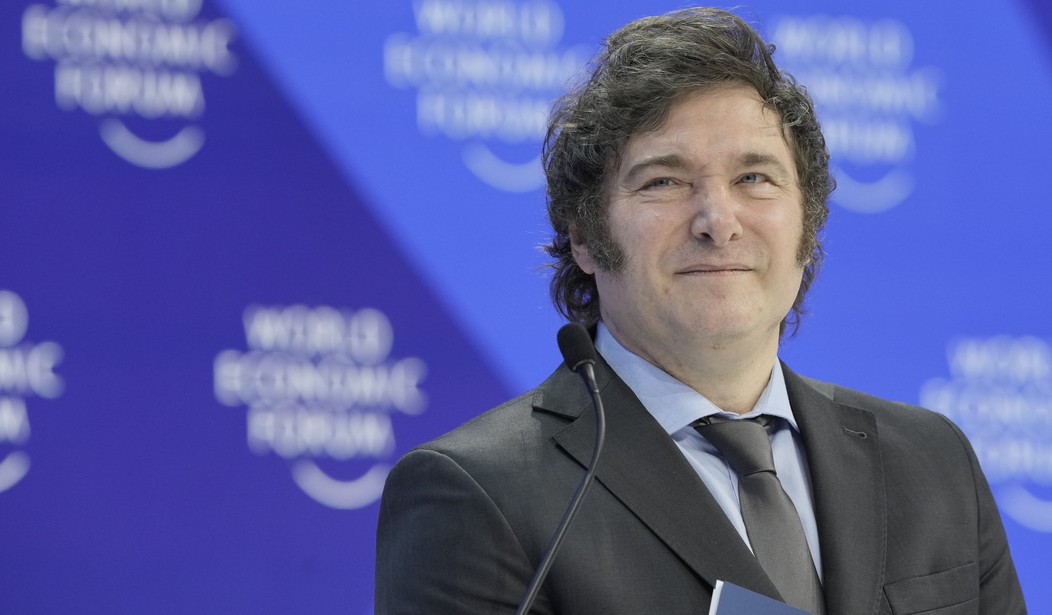A new book from the economist Philipp Bagus, professor of economics at Rey Juan Carlos University in Madrid, has just been published in Germany. The insightful foreword was penned by none other than Javier Milei himself, who recounts how he became a follower of the Austrian School of Economics: After being captivated by a book from the economist Murray Rothbard, Milei went to a bookshop and spent all the money he had on 20 books by Austrian School theorists. He then calculated exactly how much he would need for food, for taxis, and for travelling to work, and went back to the bookshop the next day and bought even more books – spending every last bit of money he had. “I must have bought about 50 books in just two days,” recalls Milei.
One of these books was "Human Action" by Ludwig von Mises: “I locked myself away for two or three days until I had finished it. I only got up to eat, go to the bathroom, and take Conan, my dog, for a walk.” He was “dazzled” by the book, and many others followed, including works by Friedrich August von Hayek and Milton Friedman. “The theory of the Austrian School is fundamental. It is like a compass that guides me in every decision I make,” writes Milei in his foreword. This episode alone demonstrates how grossly misleading it would be to compare Milei with Trump – who would surely rather watch two days of wrestling than read books by Mises and Hayek.
But Milei does not stop at simply reading economic theories; he actively promotes and popularizes them, for example on two-hour bus rides and in marketplaces, where he gives lectures on economics! Unlike other libertarians, he does not address intellectuals, he reaches out to the poor. Young, poor men are his main target group and election analyses have shown that this demographic is where he gains his strongest support. During his rallies, he takes to the stage like a rock star – in fact he used to be the lead singer of a band that mainly played Rolling Stones songs. Alongside Mises, Rothbard, and Hayek, his role models include Mick Jagger. Milei incorporates music and theatrics into his presentations, dances on stage, sings a song with the lyrics “I am the lion of the forgotten world,” puts on a play to popularize the theories of the Austrian School, and has made the chainsaw his symbol. He is a bookworm and master of self-marketing in one – and all in service of the grand idea of helping capitalism to victory.
Recommended
Milei has learned a lot from his opponents, from the Marxists, from the left. He actively rallies against the exploiters and oppressors, but for Milei these are by no means the entrepreneurs, but rather the state and individuals who leech off public resources without adding any value via productive endeavors.
Milei stands out from traditional conservatives and liberals with his rebellious approach, which resonates with young people in particular: “In Argentina,” writes Bagus, “being libertarian is now considered fashionable, much like being left-wing was in the past”. I can confirm this, because I was in Argentina in 2022, 2023 and 2024, and I had the opportunity to get to know the Milei movement and its supporters. Milei is rebellious. He challenges the establishment, the ruling class. His answer is capitalism. However, Milei’s influence extends beyond economic matters. He recognizes the significance of the “cultural struggle” and has taken a firm stance against feminism, gender ideology, and environmental-hysteria.
What the book lacks is an analysis of foreign policy perspectives. As a proponent of freedom, Milei unequivocally supports Ukraine in its fight against Russian imperialism. This sets him apart from figures like Trump and the European ‘New Right,’ with whom Bagus associates Milei. But Milei does not share the anti-Americanism of politicians such as Le Pen or parties like the German AfD. Moreover, sections of the European right are anti-capitalist and are therefore on the opposite side of the barricade to Milei. Milei’s stance is clear: he is pro-Israel, pro-Ukraine, and pro-USA.
I personally view Milei as less aligned with the European ‘New Right,’ Trump, and Bolsonaro, and as far closer to his Polish colleague Leszek Balcerowicz, a professor of economics and advocate of the teachings of Mises and Hayek. Balcerowicz’s reforms were instrumental in transforming Poland from one of the poorest countries in Europe to a leading economic powerhouse and Europe’s growth champion.
The author asks what obstacles could possibly hinder Milei’s success. He expresses concern that there is “a risk that Milei will make compromises that lead him away from the libertarian path.” Unlike Bagus, I do not see this as a threat. Milei is not a dogmatist, and his flexibility is actually one of his key strengths. Furthermore, the beauty of capitalism is that even in small doses, it dramatically improves people’s lives; you don’t need pure, textbook capitalism to achieve a positive impact.
As I see it, the greatest risk, aside from a potential assassination attempt on Milei, lies in the possibility that Argentinians may not be patient enough to reap the benefits of Milei’s reforms. History has shown that when capitalist reforms are implemented, as seen in the UK (under Thatcher), Poland (under Balcerwowicz), and other countries, initially – perhaps for two years – some things get worse before they get much better. Will the Argentinians give Milei the time and support he needs to enact his reforms successfully?
Philipp Bagus, Die Ära Milei, Langen Müller Verlag, Munich, 2024, 260 pages.

























Join the conversation as a VIP Member